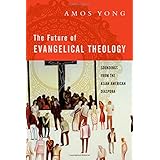The Future of Evangelical Theology: Soundings from the Asian American Diaspora
Downers Grove, IL: InterVarsity, 2014.
Available at Amazon.com
Amos Yong, a theology professor at Fuller Seminary, in this volume offers some reflections on the future evangelicalism from a Asian-American and Pentecostal framework. He notes that for Asian Christians, American Christianity is both a blessing and a bane. He is tremendously grateful for the American missionaries through whom he and his parents became Christians, but they also bequeathed to them a racialized view of the world (p. 19). He notes the growing contribution of Asian Theologians (chapter 1). Yong observes how Asian immigrants have imbibed and transformed evangelicalism in the USA (chapter 2). Addresses why Asian American evangelicalism has been decidedly lackluster compared to Asian Americans in Catholic and Mainline churches and his solution for this is that Asian American evangelicals need to embrace more fully the gospel and vocalize more readily their specific diasporic experiences as something that shapes their theology (chapter 3). Asian American Evangelicals need to engage with pentecostal voices as they are a significant part of Asian American scene (chapter 4). Yong also believes that Asian American Evangelicals can help construct a theology of migration (chapter 5) and social justice, economics, and politics (chapter 6). In the final part, Yong believes Asian American Evangelicals can challenge western notions of gender, race, and political realities which challenge assumed and envision possibilities for a truly global evangelical theological conversation (chapter 7).
The last chapter was my favourite one. Yong notes the disagreement in Pente-Evangelical Asian American churches about the role of women in leadership. I like what he said about women here:
Empowerment is not a ‘feminist’ value; rather it is a biblical and pneumatological one. What the edification and empowerment of women ought to accomplish, however, is not merely their success but that of the witness of the church in a hurting world. Hence a biblically envisioned ideal of what it means to be women of God will include also the edification and empowerment of males, not for their own sake but as men of God (pp. 223-24).
















